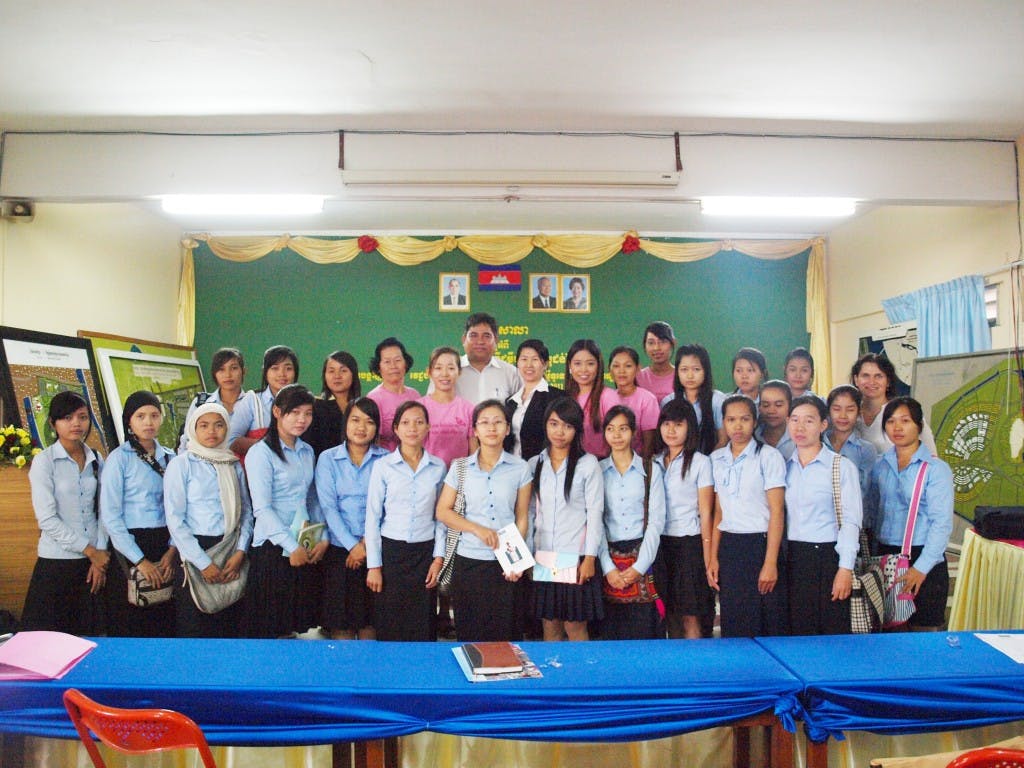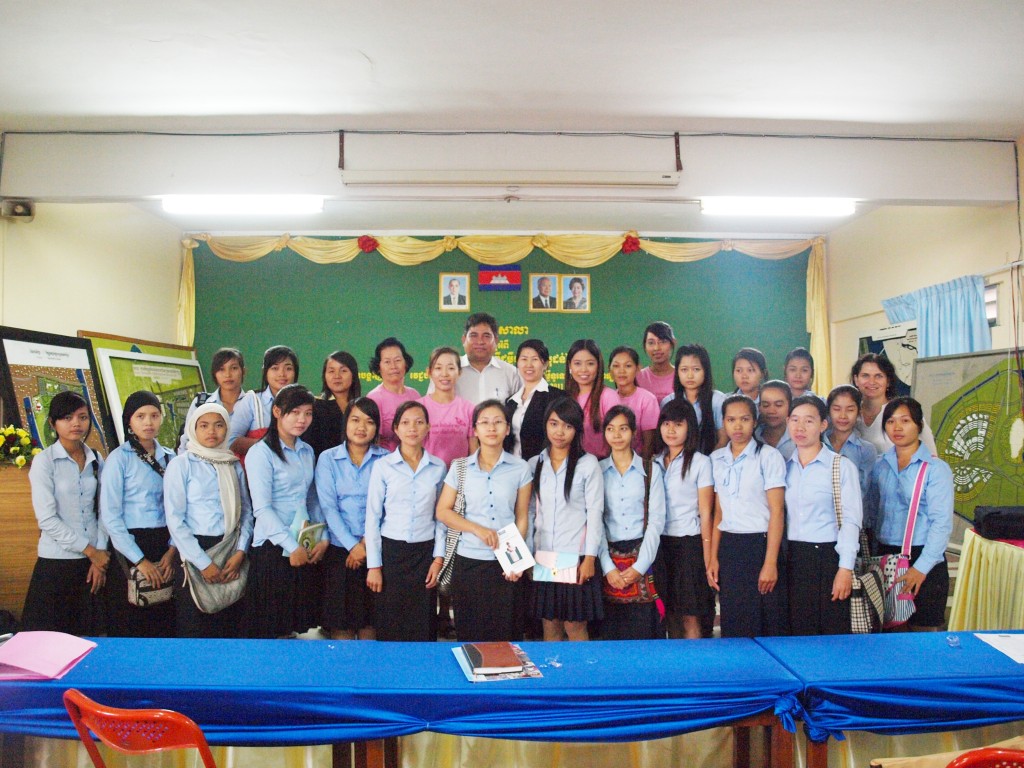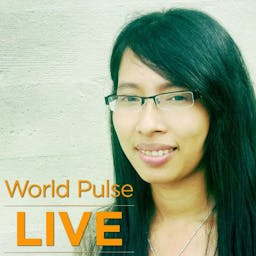Poverty and Education
Jan 21, 2015
Story


Poor Residence Areas Block, Phnom Penh -Cambodia, 02 January 2011 – Fourteen years old Oung Srey Leak had to drop out of her school for over one year now after her father's death. With the mother suffering from breast cancer, Leak has to work to raise her younger siblings and earn money for her mother's cure. This little girl, who needs education, is unfortunately reduced to housemate to support her family. “I used to cry when I see other young girls of my age on their way to school while I was heading to the market to buy food for my landlord” Srey Leak says.
Many people are moving from the more densely populated province into the city and some of them have flown to work in other neighboring countries such as Thai, Malaysia and Korea. Cambodia numbers almost 4.8 million poor people, and 90 percent of them are in rural areas. Most of them depend on agriculture for their livelihood, but at least 12 per cent of poor people are landless. Small-scale farmers practice agriculture at subsistence level, using traditional methods resulting in low productivity. Moreover, most of families from rural areas of Cambodia are forced by their parents to leave school and work in the fields or as housemaid.
I was really sad when I was asking her, her family had moved to Phnom Penh in 2009 and lives near my new house at Cambodia International Airport block. My parents always give her and her mother some money or sometimes rice. Luckily her mother has been offered a treatment from Sihanouk Hospital for the Breast Cancer, due to her early diagnose cure is still possible so she is undergoing free treatment. Anyways, Leak has to work harder to help her siblings but she really wants to study. I have helped her by contacting some NGOs in Cambodia to sponsor her for either normal or vocational education but we are still waiting for the outcome of the negotiation I had with the NGOs.
Leak's salary as a housemaid is 25$. Thus, she is not able to cater for living expenses such as education fees and hospital bills. Though her mother is benefiting free cure from Sihanouk hospital she has to contribute 10$ each month for injection.
Srey Leak reminds me my Childhood:
I immediately had sympathy for Srey Leak because her story is similar to mine. I was born in a low class family from Korki Thom Village, Kandal Province. I don't have any siblings but I do love my cousins as my siblings. Without education, my parents have met many obstacles to help our lives. They moved to Phnom Penh City when I was 3 in order to earn more money to support the family and send me to school. They earned money so hard to raise and send me to school. Lack of money was the biggest barrier of my childhood, and I learned how to overcome it and get education. I do remember my parents saying "Education is more precious than diamond", and my father telling me, "Try and learn hard daughter, it’s a real wealth you need to find and no one can steal that from you”. All these words are kept in my mind and heart forever!
Coming from a poor family does not help in getting higher education but we need to struggle and overcome all obstacles to ensure a brighter future. I had only one motto that kept me going on: “Never Be Hopeless” as I told myself I was living in a dream so a Dream is my Hope which always inspires me how to stand up to fight the barrier. Aside poverty that made it difficult to attend school, I had to fight the traditional perception that girls do not need higher education, meaning beyond Grade 6 or 9.
According to World Bank’s statement, most Cambodian children attend some schooling, but a large share complete only a few grades-with 85 percent of 15 to 19 year olds completing grade 1, while only 27 percent complete grade 7. There are also disparities in education participation rates by different regions, income groups and gender. Inefficiency and poor quality in education service delivery at primary, secondary and tertiary levels, weak local management capacity and a lack of reliability in education finance disbursement are other major challenges in the sector.
I remember when I was a child, in secondary school, most of my classmates looked down at me and didn’t even talk or listen to me, but I always encouraged myself to be strong, stand firm and learn hard. The nightmare of my life was to lose scholarship because my family was poor, they scorned me that poor people should sell vegetable or ask money from the rich in the market or on the road. All of these scorning words have been kept in my brain forever.
In high school, I had many obstacles to learn since my father earned so little money and my mother became sick. I had to share some of my study time to help them sell ice. 3 years in High School, I always had the lowest notes due to school’s corruption; most teachers forced students to attend extra class, and those who refused would fail for not paying them for extra-class. It was heartbreaking that the poor students weren’t able to regularly attend those classes.
In 2005, I was lucky to finish Grade 12 with the medium grade. But, I felt so disappointed because I lost a scholarship, just because I didn’t have money to give them when I wrote the test paper. I really felt powerless for that and on top I made my parents hopeless with the government scholarship I already lost. Been lucky again as I had a half scholarship from a Private University, Norton University for my 4 years study in Arts – English Literature.
I was so lucky indeed when searching for some scholarships I met a friend who told me I could ask Norton University to grant me a scholarship. And after taking the test, I got half scholarship – since many students have never got a chance like me to study at a well-known private university.
My Life Today:
I graduated from Norton University in 2009, on the field of English Literature and I am now pursuing a Master Program in Development Management at Norton University. I do love this course, for it will help me gain more skills for what I am doing and hoping for. I have learned how to communicate in multicultural environment. Beyond this, I have been working for First Invest Bank as an Administrator and also volunteering for Soroptimist International Phnom Penh as a Fundraising Officer. I do love all my work; it doesn't give me personal benefit but my family, community, country and the world.
Life as a Soroptimist:
Breast Cancer is ranked Number 2 in Cambodia and women having a breast cancer are 80% late to be cured and most of them are from poor rural areas. World Bank states that 35% of Cambodia's population around 15 million, lives on less than $0.50 USD per day; moreover, an alarming number of Cambodian women die every year due to a lack of public awareness, limited cancer screening opportunities and high cost of treatment. Over 80% of breast cancer in Cambodia is diagnosed very late. Offering the rural poor population of Cambodia free services is critical because of exorbitant cancer care cost which often prevents cancer patients from seeking treatment.
I became a member of Soroptimists in June 2010, our first project is Breast Cancer Awareness, and we are happy to volunteer and be soroptimists. My life has changed since I involved with Soroptimist. We are working around the world to empower women and girls to help them live better and brighter lives. Many women and girls in Cambodia died because of this disease; a diagnosis of breast cancer is scary for any woman. But imagine being a woman in Cambodia, where the number of physicians is estimated at a dismal 16 for every 100,000 citizens, and where the cost of even basic medication is beyond the reach of most people.
We have spread out the news and how to protect Breast Cancer to the women and poor rural areas. Currently, we had a training about Breast Cancer Awareness at Norton University where was presented by Doctor Preap Ly, a doctor from Sihanouk Hospital – Center oh Hope.
Life with PulseWire as Correspondent:
I joined WorldPulse since July 2010. Yes only a few months on this platform but my life has changed. I have started being confident, stronger, and brave; I have learned from others and my own mistake. Moreover, I always get wonderful ideas and encouragement from PulseWire sisters and staff. I have built more capacity - built up personal and professional skills. Mostly I will have a network with World Pulse partners that can be helpful for problem solving.
I am so proud of being selected as one of 31 women among 600 candidates from 87 countries for 2010 Voices of Our Future Correspondent Training. Being a correspondent makes me more confident and I know who I am, where I am standing, what I am doing and who I will be. It’s a halfway success in my life to bring my hope and dream to reality.
Until Rachael introduced me to 10x10 Act Project – Educate Girl Change the World. It seemed just like a dream for me to sit in front of 10x10 Staff and talk about my life. I felt happy and excited to talk to her, Yasmina Guerda, in my house. It was the first time someone was interested about my life’s journey. We met and discussed 2 hours about every challenge of my life, especially, my struggle for education despite my family's poor condition.
Moreover, I have joined some projects to help women everywhere; I am currently collaborating with Patty Kean, a Director and President for Helpwomenheal, a non-profit organization that harnesses the power of raising awareness about health conditions for most Afghan women and children, including refugees by hosting events to raise some donations from Cambodia or other countries if possible.
My Vision and Dream:
Many poorer countries such as Cambodia suffer from an inadequate education system. This has the effect of keeping people poor, as without literacy and economically viable skills, they don’t have any way of improving their situation. In Cambodia, NGOs play quite a big role in helping to provide education for the children who are most in need, but education in the country overall still needs much more money being spent on it.
Due to poverty Education in Cambodia is still limited for those who live in rural areas and in poorer parts of the cities. Most people are uneducated, or only finished primary school. We need to encourage and empower all girls to get an education so they can avoid being trafficked into the sex industry where approximately 30% of sex workers are under 18 years of age. Conditions of poverty and high unemployment makes teen girls—and their families—extremely vulnerable to the promises of work in the city, not realizing the realities of what awaits them.
I will be happy if I can see all these children of poor families, especially, girls have full and free access to education and gender is equality. I want girls to equally get education as I did. I am eager to learn more and raise awareness about the dangers we are facing and help develop my village and similar. I also envision working towards eradication of problems like insecurity, trafficking and the degradation of the environment.
I have a dream, and I am living for my dream. Living in a dream is what encourages me working towards my goals. My dream is to set up an NGO that will work to promote human rights, education and reduce poverty. Let's see how far I can achieve my dream.
This article is part of a writing assignment for Voices of Our Future, which is providing rigorous web 2.0 and new media training for 30 emerging women leaders. We are speaking out for social change from some of the most unheard regions of the world.




